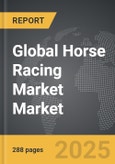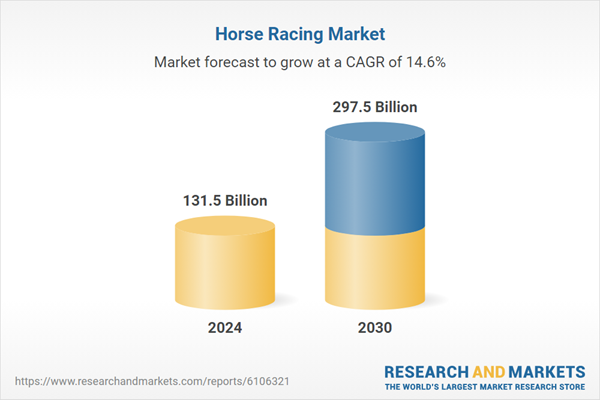Global Horse Racing Market - Key Trends & Drivers Summarized
How Is Modern Technology Influencing the Age-Old Sport of Horse Racing?
In a sport long steeped in tradition, horse racing is now embracing a wave of technological innovation that is reshaping its operations, analytics, and overall viewer experience. From the use of biometric monitoring systems to assess a horse's physical performance in real time to the deployment of high-definition drones and motion cameras for race broadcasting, the incorporation of advanced tools is making the sport more transparent, data-driven, and fan-centric. Trainers and owners are now relying on GPS trackers, heart rate monitors, and gait analysis software to fine-tune training regimens and detect early signs of injury or fatigue. Betting platforms are also undergoing a digital transformation, with artificial intelligence and predictive algorithms being used to offer smarter wagering options and customized recommendations. Virtual reality is being introduced at racecourses to provide immersive experiences for fans, while augmented reality overlays are enhancing televised race commentary with live stats and positional tracking. On the back end, race management systems now allow for more efficient scheduling, registration, and race-day logistics, improving overall organizational efficiency. Even veterinary care has evolved, with thermal imaging and portable diagnostic tools being used to monitor the health of horses with greater precision. Digital ticketing and mobile apps are making it easier for audiences to engage with events, while social media integrations are helping racing clubs reach broader and younger demographics. These technologies are not replacing the essence of the sport but rather enhancing every aspect of it, offering improved safety for horses and riders and better experiences for fans and stakeholders.Why Is Globalization Reshaping the Geography and Popularity of Horse Racing?
Horse racing, once concentrated in a few cultural strongholds, is now experiencing a broadening of its global footprint, driven by expanding interest, international investment, and cross-border breeding programs. Traditionally dominant regions such as the United Kingdom, the United States, and Japan are being joined by emerging markets in the Middle East, Southeast Asia, and South America, each developing sophisticated infrastructure and hosting high-stakes races that attract global attention. Countries like the United Arab Emirates and Saudi Arabia have introduced lavish racing festivals with some of the world's richest purses, positioning themselves as new hubs of equestrian sport. Meanwhile, Australia continues to integrate international talent into its seasonal carnivals, boosting its profile and competitiveness. This expansion is not limited to elite racing; grassroots programs and local circuits are flourishing in parts of Africa and Eastern Europe as well, often supported by government initiatives aimed at promoting tourism and rural development. The rise in international syndicates and joint ownership models is also fostering global collaboration, with owners from different continents investing in breeding and racing operations across borders. Bloodline diversity is increasing as horses are transported for breeding and competition, resulting in more genetically versatile stock. As global racing calendars become more interconnected, trainers and jockeys are traveling more frequently, sharing techniques and creating a more unified, competitive environment. Online streaming has been instrumental in allowing fans to follow races from around the world, making the sport more accessible than ever. Globalization is creating a more inclusive, diverse, and competitive horse racing ecosystem that continues to grow beyond its traditional arenas.What Role Are Changing Audience Preferences Playing in Reimagining the Sport?
As horse racing competes for attention in a saturated entertainment landscape, shifting audience preferences are prompting stakeholders to rethink how the sport is packaged, consumed, and experienced. Today's audiences, especially younger demographics, value convenience, interactivity, and inclusivity, which is influencing the way racecourses, betting companies, and broadcasters present their offerings. Race days are being rebranded as lifestyle events, featuring music performances, culinary experiences, fashion shows, and family-friendly activities that broaden the appeal beyond core racing enthusiasts. In addition to live race viewing, fans increasingly expect digital engagement through mobile apps that provide real-time updates, exclusive behind-the-scenes content, and interactive features like voting and prediction games. Livestreaming on social platforms is becoming common, allowing users to share their excitement instantly and reach new viewers who might not follow traditional racing broadcasts. Betting behavior is also evolving, with casual punters preferring simpler, gamified experiences that require less expertise and offer quick payouts. To cater to this, many platforms now include beginner-friendly tutorials, social betting pools, and community discussions. Accessibility has become a central theme, with more inclusive marketing aimed at women, younger fans, and diverse communities. Sustainability is also entering the conversation, with eco-conscious spectators calling for greener racecourse operations and animal welfare advocacy playing a larger role in public perception. Loyalty programs, digital collectibles, and fan clubs are being used to build lasting relationships with supporters. These audience-driven changes are not only keeping the sport relevant in a digital age but are also laying the groundwork for a broader, more engaged fanbase that supports the longevity of the industry.What Key Factors Are Powering the Continued Growth of the Horse Racing Market?
The growth in the horse racing market is driven by several factors that stem from evolving industry dynamics, consumer behavior, and broader economic developments. A primary driver is the modernization of the betting ecosystem, which has seen the rise of legal online wagering platforms that offer secure, fast, and convenient betting experiences to users worldwide. This accessibility has significantly expanded the participant base and boosted wagering volumes across multiple jurisdictions. Simultaneously, increased investments from both private and public sectors into the infrastructure of racecourses, training centers, and breeding facilities are strengthening the foundational aspects of the sport. Another key factor is the expansion of international racing circuits, which provide more opportunities for global participation and engagement while also generating revenue through media rights, sponsorships, and tourism. The influence of elite events such as the Kentucky Derby, Royal Ascot, and the Dubai World Cup continues to elevate global interest, attracting both veteran enthusiasts and newcomers through high-profile marketing and cultural significance. Breeding and bloodstock markets have become increasingly sophisticated, supported by advancements in genetics, veterinary science, and global trade networks, leading to improved equine performance and increased commercial activity. Regulatory reforms in several countries have also encouraged industry consolidation and professionalization, making the sport more transparent and trustworthy for stakeholders. Changing consumer preferences for experiential and leisure activities have made race days popular social events, further diversifying revenue streams. The presence of broadcast partnerships, influencer collaborations, and e-sports-style fantasy leagues are also injecting new life into the fan experience. Collectively, these factors are not only supporting the sustained growth of horse racing but are also helping the sport evolve into a multifaceted entertainment and investment industry.Report Scope
The report analyzes the Horse Racing market, presented in terms of market value (US$). The analysis covers the key segments and geographic regions outlined below:- Segments: Type (Flat Racing, Jump Racing, Harness Racing, Endurance Racing); Revenue Stream (Betting Revenue, Live Event Revenue, Broadcasting Rights Revenue, Sponsorship & Advertising Revenue, Horse Sales & Breeding Revenue).
- Geographic Regions/Countries: World; United States; Canada; Japan; China; Europe (France; Germany; Italy; United Kingdom; Spain; Russia; and Rest of Europe); Asia-Pacific (Australia; India; South Korea; and Rest of Asia-Pacific); Latin America (Argentina; Brazil; Mexico; and Rest of Latin America); Middle East (Iran; Israel; Saudi Arabia; United Arab Emirates; and Rest of Middle East); and Africa.
Key Insights:
- Market Growth: Understand the significant growth trajectory of the Flat Racing segment, which is expected to reach US$169.4 Billion by 2030 with a CAGR of a 16.6%. The Jump Racing segment is also set to grow at 11.5% CAGR over the analysis period.
- Regional Analysis: Gain insights into the U.S. market, valued at $35.8 Billion in 2024, and China, forecasted to grow at an impressive 19.7% CAGR to reach $65.1 Billion by 2030. Discover growth trends in other key regions, including Japan, Canada, Germany, and the Asia-Pacific.
Why You Should Buy This Report:
- Detailed Market Analysis: Access a thorough analysis of the Global Horse Racing Market, covering all major geographic regions and market segments.
- Competitive Insights: Get an overview of the competitive landscape, including the market presence of major players across different geographies.
- Future Trends and Drivers: Understand the key trends and drivers shaping the future of the Global Horse Racing Market.
- Actionable Insights: Benefit from actionable insights that can help you identify new revenue opportunities and make strategic business decisions.
Key Questions Answered:
- How is the Global Horse Racing Market expected to evolve by 2030?
- What are the main drivers and restraints affecting the market?
- Which market segments will grow the most over the forecast period?
- How will market shares for different regions and segments change by 2030?
- Who are the leading players in the market, and what are their prospects?
Report Features:
- Comprehensive Market Data: Independent analysis of annual sales and market forecasts in US$ Million from 2024 to 2030.
- In-Depth Regional Analysis: Detailed insights into key markets, including the U.S., China, Japan, Canada, Europe, Asia-Pacific, Latin America, Middle East, and Africa.
- Company Profiles: Coverage of players such as Bandit Industries, Inc., BEAST - A Division of Bandit, CBI - Continental Biomass Ind., Doppstadt Group, Duratech Industries and more.
- Complimentary Updates: Receive free report updates for one year to keep you informed of the latest market developments.
Some of the 42 companies featured in this Horse Racing market report include:
- Arena Racing Company
- Arrowfield Stud Pty. Limited
- Bally's Corporation
- Betfair Group Limited
- Churchill Downs Incorporated
- Coolmore and Associated Stud Farms Limited
- Exacta Systems LLC
- Fasig-Tipton Company Inc.
- Godolphin LLC
- Hronis Racing LLC
- Juddmonte Farms Limited
- Keeneland Association Inc.
- Racing Victoria Limited
- Shadwell Racing
- Spendthrift Farm LLC
- Tattersalls Limited
- The Jockey Club
- Weatherbys Ltd.
- WinStar Farm LLC
- Woodbine Entertainment Group
This edition integrates the latest global trade and economic shifts into comprehensive market analysis. Key updates include:
- Tariff and Trade Impact: Insights into global tariff negotiations across 180+ countries, with analysis of supply chain turbulence, sourcing disruptions, and geographic realignment. Special focus on 2025 as a pivotal year for trade tensions, including updated perspectives on the Trump-era tariffs.
- Adjusted Forecasts and Analytics: Revised global and regional market forecasts through 2030, incorporating tariff effects, economic uncertainty, and structural changes in globalization. Includes historical analysis from 2015 to 2023.
- Strategic Market Dynamics: Evaluation of revised market prospects, regional outlooks, and key economic indicators such as population and urbanization trends.
- Innovation & Technology Trends: Latest developments in product and process innovation, emerging technologies, and key industry drivers shaping the competitive landscape.
- Competitive Intelligence: Updated global market share estimates for 2025, competitive positioning of major players (Strong/Active/Niche/Trivial), and refined focus on leading global brands and core players.
- Expert Insight & Commentary: Strategic analysis from economists, trade experts, and domain specialists to contextualize market shifts and identify emerging opportunities.
Table of Contents
Companies Mentioned (Partial List)
A selection of companies mentioned in this report includes, but is not limited to:
- Arena Racing Company
- Arrowfield Stud Pty. Limited
- Bally's Corporation
- Betfair Group Limited
- Churchill Downs Incorporated
- Coolmore and Associated Stud Farms Limited
- Exacta Systems LLC
- Fasig-Tipton Company Inc.
- Godolphin LLC
- Hronis Racing LLC
- Juddmonte Farms Limited
- Keeneland Association Inc.
- Racing Victoria Limited
- Shadwell Racing
- Spendthrift Farm LLC
- Tattersalls Limited
- The Jockey Club
- Weatherbys Ltd.
- WinStar Farm LLC
- Woodbine Entertainment Group
Table Information
| Report Attribute | Details |
|---|---|
| No. of Pages | 288 |
| Published | February 2026 |
| Forecast Period | 2024 - 2030 |
| Estimated Market Value ( USD | $ 131.5 Billion |
| Forecasted Market Value ( USD | $ 297.5 Billion |
| Compound Annual Growth Rate | 14.6% |
| Regions Covered | Global |









